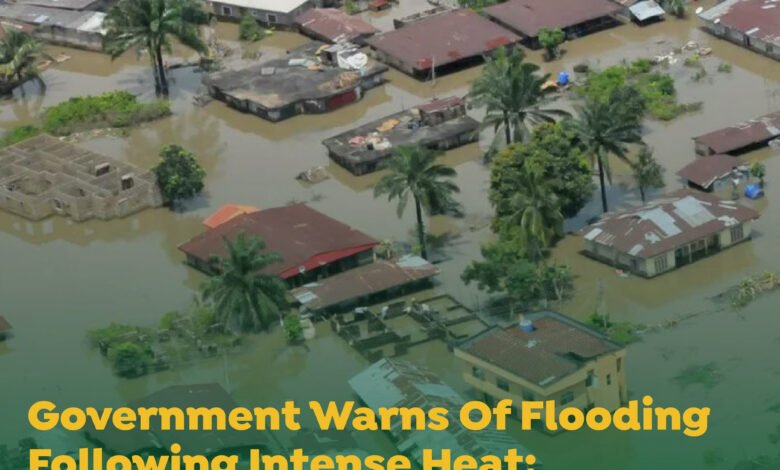Government Warns of Flooding Following Intense Heat: Here’s How to Weather the Storm

The prospect of millions of Nigerians waking up to find their familiar streets transformed into raging rivers overnight is a daunting reality, as forecasts predict high chances of flooding across 31 states.
In the UAE and Oman, the torrential rains have wreaked havoc; shattering several properties and taking at least 20 lives,
To avoid a similar fate, an agency of the Federal Government of Nigeria has predicted impending flooding between April and November but has offered insights on how to stem the ugly tide.
Minister of Water Resources and Sanitation, Prof Joseph Utsev, said states susceptible to high flood risk include Adamawa, Akwa-Ibom, Anambra, Bauchi, Bayelsa, Benue, Borno, Cross River, and Delta.Ebonyi, Edo, Imo, Jigawa, Kaduna, and Kano.
Others are Katsina, Kebbi, Kogi, Kwara, Lagos, Nasarawa, Niger, Ogun, Ondo, Osun, Oyo, Plateau, Rivers, Sokoto, Taraba, and Yobe. The minister equally said some local governments will experience moderate flood risk while others will contend with high.
Reacting, some state governments are reported to have launched sensitisation and campaigns about the grave danger of blocking the drainage with refuse, while others have begun demolishing the Riverside buildings. In Lagos, those living in riverine areas have been asked to relocate.
Over the years, Nigeria has grappled with flooding, which has destroyed billions worth of properties, taken hundreds of innocent lives, and rendered millions homeless. In 2012, the damage was estimated at $17 billion.
However, the damage caused in 2022 was much more severe. Federal Government Data reveals that it displaced 1.4 million Nigerians, killed 603, and severely injured over 2400. In addition, it damaged 82,035 houses and affected 332,327 hectares of land.
The flood, which devastatingly washed off farmlands and stuck vehicles loaded with fuel and foodstuffs, experts believe was caused by the combined factors of human and natural elements, eventually led to food scarcity.
Causes and Impact of Flooding
In Nigeria, flooding is caused by factors such as heavy downpours, climate change, blocking of the drainage with refuse, and water released from the Lagdo Dam in neighbouring Cameroon, according to experts.
Flooding is said to be one of the most disastrous natural disasters. When it happens, it destroys businesses and properties, damages vital infrastructure, and prevents access to essential public services. It equally takes the lives of its victims.
Ways out
In preventing the perennial flooding in the country, environmentalists have offered different solutions to the natural disaster.
Professor Clifford Nwanna, an environmentalist and Dean of the Faculty of Environmental Sciences, Nnamdi Azikiwe University, Awka, Anambra State, said the reason environmental laws have not worked in the country is because of the weak enforcement on the part of the government.
Noting that there is no permanent solution to prevent flooding, Prof Nwanna posited that effective measures like creating and clearing existing drainages, canals, and vegetation would tremendously reduce the impact of natural disasters in the country. He equally advised the federal government to dredge the River Niger to accommodate.
The first female Surveyor in private practice in Delta State, Mrs Etuonovbe, believes keeping the gutters clean will go a long way in preventing flood; she urged Nigerians not to “put refuse or solid materials in drains, and discourage others from doing so.
Always help to clean gutters or drains and encourage others to do the same. Identify a higher place where you can run to during floods. Don’t remove plants or trees unnecessarily, and help to replant burnt or cleared forests.”
Clement Onyeaso Nze, The Director General of NIHSA, noted that continuous clearing of waterways coordinated dams and reservoir operations, among other things, will ensure the free flow of water in rivers and drainages and subsequently reduce the impact of flooding.
Floods may be inevitable, but their devastation isn’t. By taking action now, from individuals keeping gutters clear to states enforcing environmental laws, we can turn the tide on flooding.
Together, let’s build a Nigeria that weathers any storm.





